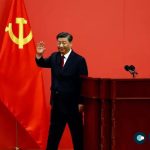
China’s Xi to Speak to Zelensky, Meet Next Week With Putin
SINGAPORE—Chinese leader Xi Jinping plans to speak with Ukrainian President Volodymyr Zelensky for the first time since the start of the Ukraine war, likely after he visits Moscow next week to meet with Russian President Vladimir Putin, according to people familiar with the matter.
The meetings with Messrs. Putin and Zelensky, the latter of which is expected to take place virtually, reflect Beijing’s effort to play a more active role in mediating an end to the war in Ukraine, some of the people said.
Mr. Xi is considering visiting other European countries as part of his trip to Russia, though his full itinerary has yet to be confirmed, according to the people.
A direct conversation with Mr. Zelensky, if it happens, would mark a significant step in Beijing’s efforts to play peacemaker in Ukraine, which have so far been met with skepticism in Europe. It would also bolster Beijing’s credentials as a global power broker after it facilitated a surprise diplomatic breakthrough between Saudi Arabia and Iran last week.
Reuters earlier reported that Mr. Xi’s Moscow visit could happen as early as next week. The Wall Street Journal reported in February that Mr. Xi was preparing to visit Moscow in the coming months.
The overseas trip would mark Mr. Xi’s first after he secured an unprecedented third term as China’s head of state. It comes as the 69-year-old leader seeks to burnish his status as a global statesman and navigate escalating competition with the U.S. and its allies.
China’s Foreign Ministry didn’t immediately respond to a request for comment.
Mr. Xi’s travel schedule is intended in part to capitalize on momentum from the Saudi-Iran deal, signed in Beijing, which marked the end of seven years of estrangement, according to some of the people. That agreement heralded a notable rise in China’s influence in the Middle East, which had been previously dominated by the U.S. as the primary power broker.
The bridge-building effort marked the first time that Beijing has intervened so directly in the Mideast’s political rivalries, and was its first time successfully brokering such a deal.
China’s last ambitious effort to play the role of global peacemaker came in the early 2000s, when it launched six-party talks aimed at curtailing North Korea’s nuclear weapons program in exchange for aid. The talks, which included the U.S., failed in 2008 when North Korea withdrew despite relying heavily on economic support from Beijing.
Achieving a breakthrough in Ukraine would be a taller task than the Saudi-Iran deal, especially as both sides in the war believe too much remains to be played out on the battlefield. Neither has shown an inclination to stop fighting.
Beijing nevertheless has an active interest in bringing an end to the conflict. The war has put Beijing in a precarious situation, forcing Mr. Xi to balance China’s “no limits” partnership with Russia and his own close relationship with Mr. Putin against increasing distrust and tension with the U.S. and its allies.
Last month, China cast itself as a neutral mediator in calling for a cease-fire and peace talks to end the war in Ukraine. In a 12-point document, China’s Foreign Ministry called for the pursuit of a political solution to the conflict and an end to unilateral sanctions. It also appeared to warn Moscow against escalating the conflict with nuclear weapons.
The Wall Street Journal













Comments